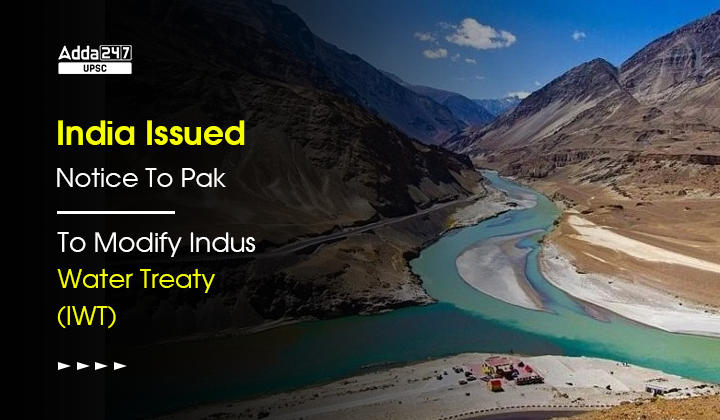Table of Contents
Indus Water Treaty(IWT) 1960: Indus Water Treaty(IWT) 1960 is a bilateral agreement between India and Pakistan that was signed in September 1960. Since Then IWT survived three wars(1965, 1971, 1999), and many terror attacks.
What Is The Issue About Indus Water Treaty(IWT) 1960?
In News
On January 25, 2023 India Issued a Notice To Pakistan To Modify Indus Water Treaty(IWT) which was signed in 1960.
Background
In 2015, Pakistan requested for appointment of a neutral expert to examine its technical objections to India’s Kishenganga and Ratle Hydro Electric Projects.
How Will It Impact Indus Water Treaty(IWT) 1960?
- India’s Notice To Pakistan To Modify Indus Water Treaty(IWT) 1960 would effectively mean that the treaty can be opened for re-negotiations for the first time in over six decades.
- While India has not listed out what can be modified, a change in any provision means a new treaty.
About The Indus Water Treaty(IWT) 1960
- Indus Water Treaty(IWT) was signed by the then Prime Minister of India Jawaharlal Nehru and then Pakistani President Mohammed Ayub Khan in Karachi on September 19, 1960.
- The Indus Water Treaty(IWT) 1960 was signed after nine years of negotiations between the two countries.
- Under the Indus water treaty(IWT) 1960, the waters of 3 Eastern Rivers – Sutlej, Beas, and Ravi are allocated to India for unrestricted use while the waters of 3 Western rivers – Indus, Jhelum, and Chenab go to Pakistan.
- Also, New Delhi has the right to generate hydroelectricity through the run of the river projects on the 3 Western rivers, subject to specific criteria for design.
- Under the Indus Water Treaty(IWT) 1960, Pakistan can raise technical objections on the design of Indian hydroelectric projects on Western rivers.
How Will Economic Crisis In Pakistan Impact Its Neighbours?
How Does the IWT 1960 works?
- The IWT 1960 sets out a mechanism for cooperation and information exchange between the two countries regarding their use of the rivers, known as the Permanent Indus Commission, which has a Commissioner from each country.
- The Treaty also sets forth distinct procedures to handle issues which may arise:
-
- Questions are handled by the Commission;
- Differences are to be resolved by a Neutral Expert; and
- Disputes are to be referred to a seven-member arbitral tribunal called the “Court of Arbitration.”
What Is 3 stage graded mechanism?
- Article 9 of the treaty lays out the provision of dispute resolution with 3 stage graded mechanism.
- The first stage is a question that can be resolved at the level of Indo-Pak Indus water commissioners.
- If it is not resolved at that stage, then it becomes a difference that can be resolved by neutral experts.
- If neutral experts fail to resolve, then it comes to the stage of Court of arbitration.
What Is The Role Of World Bank In IWT 1960?
- As a signatory to the IWT 1960, the World Bank’s role is limited and procedural.
- In particular, its role in relation to “differences” and “disputes” is limited to the designation of individuals to fulfill certain roles in the context of Neutral Expert or Court of Arbitration proceedings when requested by either or both of the Parties.
What Is The Current Dispute?
- In 2015, Pakistan requested the appointment of a neutral expert to examine its technical objections to India’s Kishenganga and Ratle Hydro Electric Projects (HEPs).
- In 2016, Pakistan unilaterally retracted from the “neutral expert” mechanism and proposed that a “Court of Arbitration” decide on its objections.
- Meanwhile, India made a separate request for the matter to be referred to a neutral expert.
- The initiation of two simultaneous processes on the same issue essentially creates a legal issue.
- That year, the World Bank had paused the process, only to revive it in March 2022.
- However, due to Pakistan’s continuing insistence, the World Bank has recently initiated actions on both the neutral expert and Court of Arbitration processes.
- That’s why Issued Notice To Pakistan To Modify Indus Water Treaty(IWT) 1960.
- Also, despite repeated efforts by India to find a mutually agreeable way forward, Pakistan refused to discuss the issue during the five meetings of the Permanent Indus Commission from 2017 to 2022.
Important Fact
|



 TSPSC Group 1 Question Paper 2024, Downl...
TSPSC Group 1 Question Paper 2024, Downl...
 TSPSC Group 1 Answer key 2024 Out, Downl...
TSPSC Group 1 Answer key 2024 Out, Downl...
 UPSC Prelims 2024 Question Paper, Downlo...
UPSC Prelims 2024 Question Paper, Downlo...
